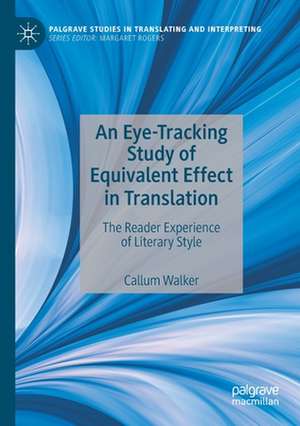An Eye-Tracking Study of Equivalent Effect in Translation: The Reader Experience of Literary Style: Palgrave Studies in Translating and Interpreting
Autor Callum Walkeren Limba Engleză Paperback – 24 noi 2021
| Toate formatele și edițiile | Preț | Express |
|---|---|---|
| Paperback (1) | 731.41 lei 6-8 săpt. | |
| Springer International Publishing – 24 noi 2021 | 731.41 lei 6-8 săpt. | |
| Hardback (1) | 736.64 lei 6-8 săpt. | |
| Springer International Publishing – 24 noi 2020 | 736.64 lei 6-8 săpt. |
Din seria Palgrave Studies in Translating and Interpreting
- 8%
 Preț: 601.11 lei
Preț: 601.11 lei -
 Preț: 318.07 lei
Preț: 318.07 lei - 20%
 Preț: 816.68 lei
Preț: 816.68 lei - 9%
 Preț: 1608.11 lei
Preț: 1608.11 lei - 15%
 Preț: 645.60 lei
Preț: 645.60 lei - 18%
 Preț: 942.01 lei
Preț: 942.01 lei - 18%
 Preț: 777.83 lei
Preț: 777.83 lei -
 Preț: 483.12 lei
Preț: 483.12 lei -
 Preț: 385.84 lei
Preț: 385.84 lei -
 Preț: 424.61 lei
Preț: 424.61 lei - 18%
 Preț: 726.06 lei
Preț: 726.06 lei -
 Preț: 453.01 lei
Preț: 453.01 lei - 15%
 Preț: 637.78 lei
Preț: 637.78 lei - 15%
 Preț: 562.00 lei
Preț: 562.00 lei - 18%
 Preț: 950.33 lei
Preț: 950.33 lei - 18%
 Preț: 731.73 lei
Preț: 731.73 lei - 18%
 Preț: 731.10 lei
Preț: 731.10 lei - 18%
 Preț: 950.96 lei
Preț: 950.96 lei - 15%
 Preț: 636.80 lei
Preț: 636.80 lei - 15%
 Preț: 644.30 lei
Preț: 644.30 lei -
 Preț: 386.22 lei
Preț: 386.22 lei - 18%
 Preț: 948.47 lei
Preț: 948.47 lei -
 Preț: 387.58 lei
Preț: 387.58 lei - 15%
 Preț: 580.36 lei
Preț: 580.36 lei -
 Preț: 379.09 lei
Preț: 379.09 lei - 18%
 Preț: 1402.23 lei
Preț: 1402.23 lei - 18%
 Preț: 781.77 lei
Preț: 781.77 lei - 15%
 Preț: 642.68 lei
Preț: 642.68 lei - 15%
 Preț: 644.95 lei
Preț: 644.95 lei - 15%
 Preț: 640.55 lei
Preț: 640.55 lei - 15%
 Preț: 696.18 lei
Preț: 696.18 lei - 15%
 Preț: 636.45 lei
Preț: 636.45 lei -
 Preț: 484.69 lei
Preț: 484.69 lei - 15%
 Preț: 645.14 lei
Preț: 645.14 lei
Preț: 731.41 lei
Preț vechi: 891.96 lei
-18% Nou
Puncte Express: 1097
Preț estimativ în valută:
139.97€ • 143.34$ • 116.43£
139.97€ • 143.34$ • 116.43£
Carte tipărită la comandă
Livrare economică 18 martie-01 aprilie
Preluare comenzi: 021 569.72.76
Specificații
ISBN-13: 9783030557713
ISBN-10: 3030557715
Pagini: 402
Ilustrații: XX, 402 p. 73 illus.
Dimensiuni: 148 x 210 mm
Greutate: 0.55 kg
Ediția:1st ed. 2021
Editura: Springer International Publishing
Colecția Palgrave Macmillan
Seria Palgrave Studies in Translating and Interpreting
Locul publicării:Cham, Switzerland
ISBN-10: 3030557715
Pagini: 402
Ilustrații: XX, 402 p. 73 illus.
Dimensiuni: 148 x 210 mm
Greutate: 0.55 kg
Ediția:1st ed. 2021
Editura: Springer International Publishing
Colecția Palgrave Macmillan
Seria Palgrave Studies in Translating and Interpreting
Locul publicării:Cham, Switzerland
Cuprins
1. Introduction.- 2. The Cognitive Paradigm in Translation Studies.- 3. Style, Stylistics and the Literary Experience.- 4. The Psychology of Reading.- 5. Translating the Cognitive Experience.- 6. Eye-Tracking the Reader Experience.- 7. Case Study: Zazie dans le métro.- 8. Towards an Empirical Study of Literary Translation or Cognitive Translation Reception Studies.
Notă biografică
Callum Walker is a lecturer in translation technology at the University of Leeds and an honorary research fellow at University College London. His research focuses on how biometric methods can be employed to gauge stylistic and phenomenological equivalence between a source text and its translation, with a particular focus on language varieties.
Textul de pe ultima copertă
This book provides a detailed example of an eye-tracking method for comparing the reading experience of a literary source text readers with readers of a translation at stylistically marked points. Drawing on principles, methods and inspiration from fields including translation studies, cognitive psychology, and language and literary studies, the author proposes an empirical method to investigate the notion of stylistic foregrounding, with 'style' understood as the distinctive manner of expression in a particular text. The book employs Raymond Queneau’s Zazie dans le métro (1959) and its English translation Zazie in the Metro (1960) as a case study to demonstrate the proposed methods. This book will be of particular interest to students and scholars of translation studies, as well as those interested in literary reception, stylistics and related fields.
Callum Walker received his PhD from the Centre for Translation Studies at University College London, UK, and currently lectures at Durham University, UK. His research focuses on how biometric methods can be employed to gauge stylistic and phenomenological equivalence between a source text and its translation, with a particular focus on language varieties.
Caracteristici
Presents a mixed-methods approach to investigating the notion of 'equivalent effect' in translation studies Establishes a critical link between stylistic notions of foregrounding, eye movements and cognitive effort Discusses the proposed notion of 'cognitive equivalence' as a sub-strand of the equivalence paradigm Demonstrates the applicability of the proposed method through a case study example of a translated text
